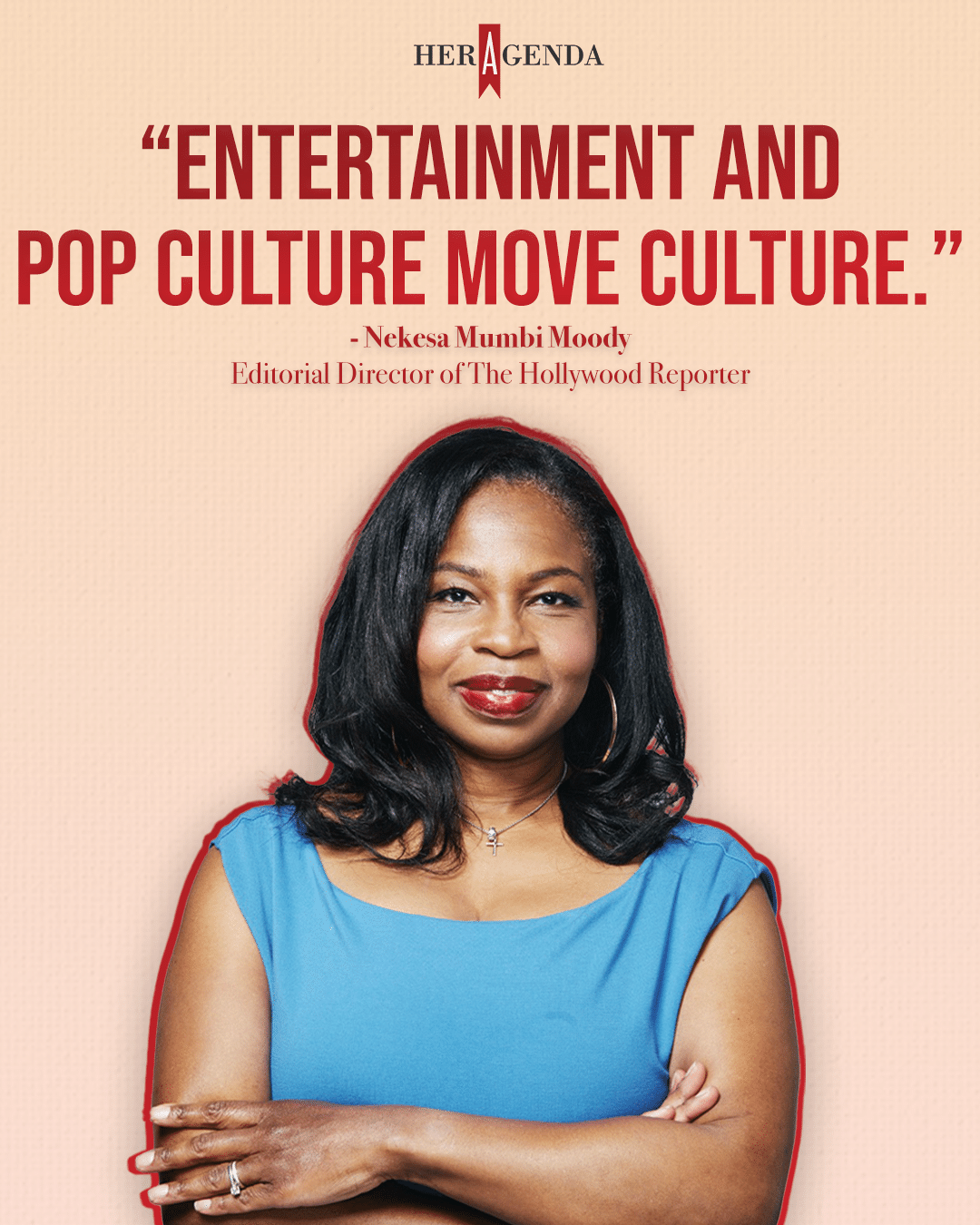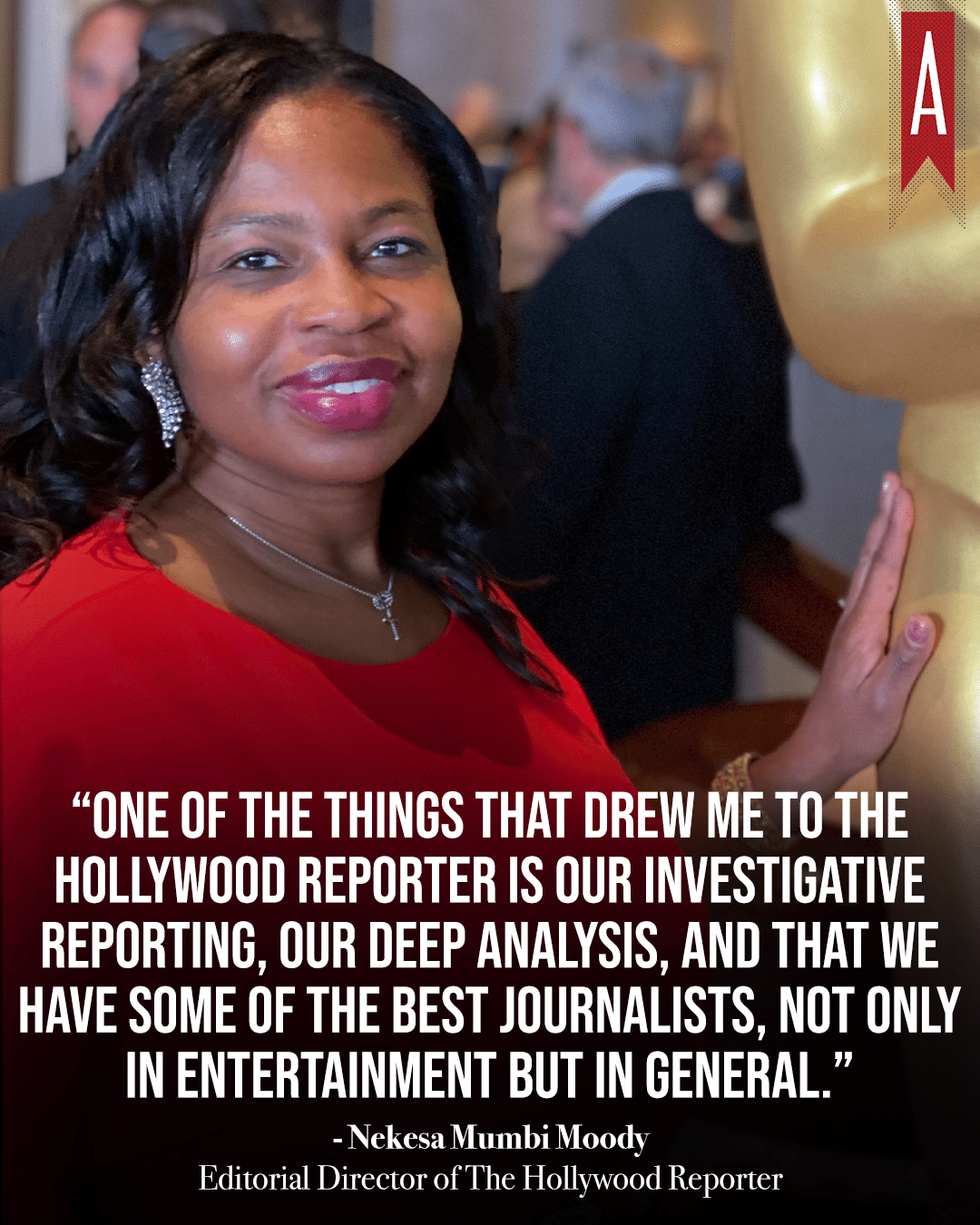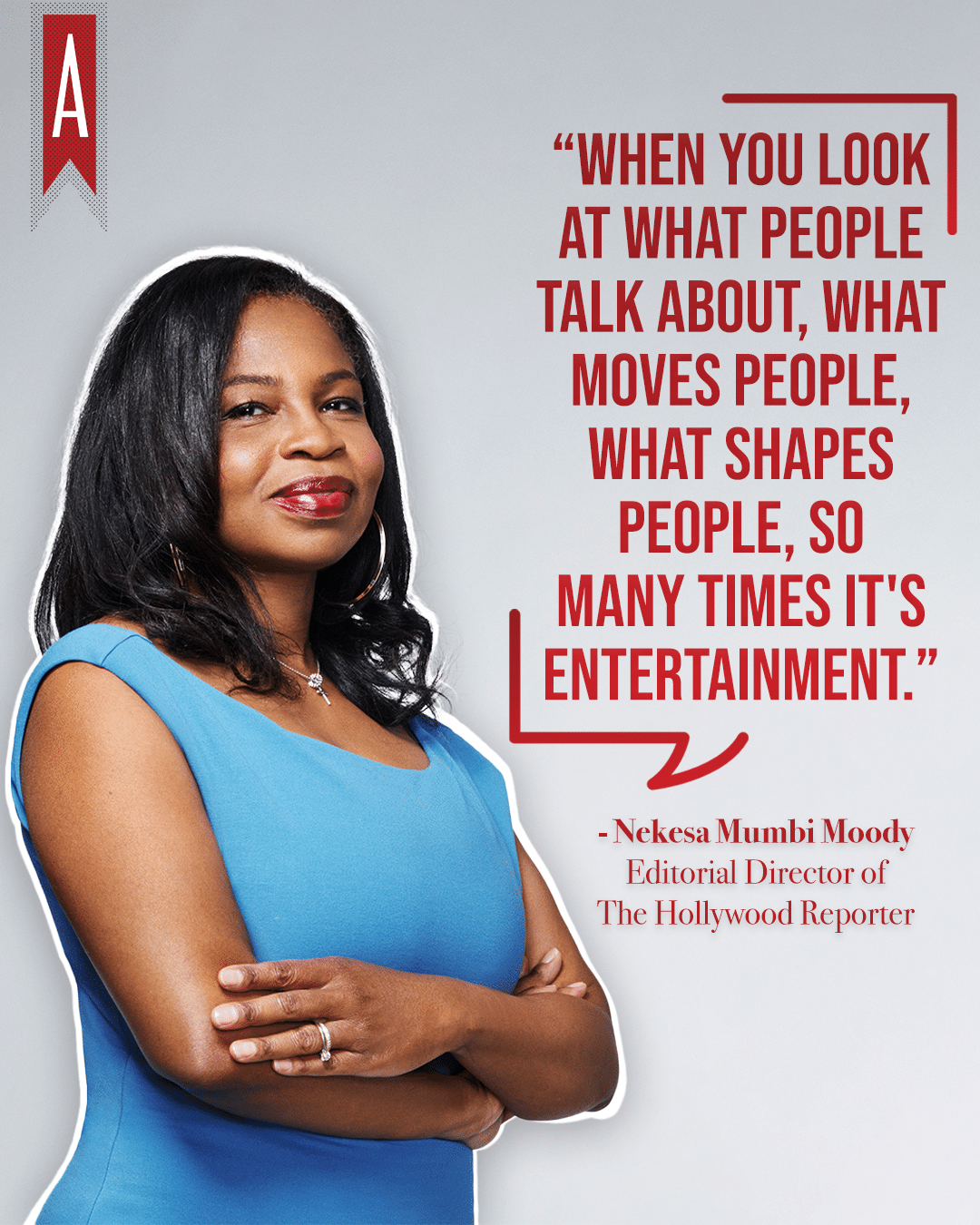As the first Black woman to hold the title of Editorial Director at The Hollywood Reporter bringing more than two decades of experience it is clear to see that Nekesa Mumbi Moody is a barrier-breaking powerhouse.
A graduate of Barnard College with an education in political science, Nekesa’s journey into journalism began as an Associated Press intern in Albany, N.Y., and she ultimately spent 20 years there rising through the ranks. Nekesa closed out that chapter as the AP’s Global Entertainment and Lifestyles Editor and in June of 2020 took on the role of editorial director of The Hollywood Reporter.
From interviewing entertainment’s biggest names including Beyoncé and Prince to overseeing coverage of the Grammy and Oscar award shows, Nekesa’s work speaks for itself. Responsible for breaking the news of Whitney Houston’s death to the world, Nekesa’s determination to highlight the truth and connect on a human level with the industry’s most noteworthy talent is the undercurrent of her knack for building trust with both the subject and the reader.
In our interview, Nekesa discusses social media breaks, the key to a great conversation, and her album of the decade.
Her Agenda: The news cycle is vicious and due to so many outlets and the social media algorithm, everything is in your face all at once. I know within your role, it’s important to stay up to date with the news, but how often do you take social media or news breaks?
Nekesa Mumbi Moody: I never take a social media break because I feel like social media has news. You’ll never see me say ‘Goodbye. I’m shutting off Instagram, or Facebook, or Twitter for two weeks,’ because there’s so much happening there. I don’t see how you’re a journalist and turn that off because it’s a key part of the news cycle. Also, besides breaking news, someone might tweet something that becomes news and becomes a part of the cycle. So, I tend to always be on. I have a five-year-old son and I’m married, so when I’m with them, I really try to be present. We went to the beach this weekend, and I was able to spend a lot of time having fun, but I always have my phone with me checking different things.
When I was at the Associated Press years ago, [they] were the only ones with a 24-hour news cycle. And, now everyone has a 24-hour news cycle. It could be one o’clock in the morning, [news] is breaking, and people are aware of what’s going on. It’s hard to try and be on top [of news] and also take a break from [it].

Her Agenda: I noticed that in your Twitter bio, you included: “Retweets do not mean an endorsement.” I’m curious to know what exactly made you explain that. Do you ever have moments when you are afraid to share your opinion?
Nekesa Mumbi Moody: I think it’s important as a journalist that you’re not too opinionated on certain things. You might be reporting on something that you just expressed an opinion about, but you want to show that you aren’t coming into something with bias. I sometimes retweet things just because they’re interesting. I think it’s important to hear what this person has to say. I think [with] social media, you have to be careful because it’s a hot take. There are so many hot takes and people respond without thinking, as well. It’s hard to tell a nuance from a 150-word character tweet. It’s really important to [be] thoughtful and realize that especially when your [account is] public, you might think [that] you’re talking to a specific audience but everyone can see [a] tweet. It’s important to think about what you’re tweeting because it can be misconstrued.

Her Agenda: Since you’ve been at Hollywood Reporter, I’ve definitely noticed a change and see that so many people, specifically people of color, are being highlighted more. Was that a goal for you?
Nekesa Mumbi Moody: I think that was definitely one of my goals. I have many goals when it comes to Hollywood Reporter. First and foremost, is top-notch journalism. One of the things that drew me to The Hollywood Reporter is our investigative reporting, our deep analysis, and that we have some of the best journalists, not only in entertainment but in general. We have amazing journalists so that was really key for me.
I also feel like it is important to spotlight voices that may not have [had] that opportunity previously. It’s something that’s always been important for me, even at the Associated Press, that we’re giving a spotlight to people who haven’t been a part of the mainstream media lens in the past. Underrepresented backgrounds can mean a lot of different things. I’m very proud of the fact that we’ve spotlighted people who are incredibly deserving. [I aim] to make sure that they are given the same consideration that others have been given.

Her Agenda: There are definitely people who don’t have as much respect for entertainment news compared to worldly news. So, why do you think that entertainment news is not only important in the entertainment industry, but in the overall news collective?
Nekesa Mumbi Moody: Entertainment and pop culture move culture. I always note that we had an entertainer as president twice. We had Donald Trump [and] we also had Ronald Reagan. So many moments in our culture have been driven by entertainment and entertainment has brought acceptance to so many things. When you look at what people talk about, what moves people, what shapes people, so many times it’s entertainment.
I think it’s really important to look at entertainment critically. It’s fun, it can be fluffy, but it’s also very important. I think it’s also very important for people to be able to do investigative reporting when it comes to entertainment. To look at the impact on culture and also entertainment drives the economy, and so forth. Entertainment has many threads woven through the American tapestry. I think it’s really, really important that people don’t discount it because it drives so much of what we’re talking about.
Her Agenda: I’ve noticed in journalism that sometimes the people you’re interviewing are closed off or are uncomfortable answering questions about themselves. As someone who has more than two decades of journalism under your belt, what do you think is key to having a great conversation?
Nekesa Mumbi Moody: I think it’s really important to establish that connection [and] make people feel comfortable. You might be talking about something related to their workout. I remember when I spoke to Aretha Franklin and one of the first things we connected about was Victor [Newman] on The Young and the Restless. So, maybe there’s something that connects them with what you’re doing. When I talk to someone, I usually don’t have questions, I try and connect with them. I make sure my tape recording is running, and try to take notes, but mainly have that conversation. I think it’s important to have a good amount of time with someone. I think that’s key so you can get to know them.
You don’t just want to get in there and ask about their project and so forth, but to ask them about who they are. I think being able to ask different questions is hard because during the press cycle they’ve probably been asked every single question. Sometimes you can connect with someone by talking about [what’s] going on that day, or you can talk about sports, and that goes into something else. It’s very important to have different pathways to connect.
Her Agenda: You used to be a music editor at Associated Press. And, in 2009 you gave a recap of the best albums of the 2000s decade and chose Amy Winehouse’s Back to Black as your mainstream pick. I want to ask you, for the 2010s, what would you say is your album of the decade?
Nekesa Mumbi Moody: Let’s see. I loved Lemonade, it’s one of my favorites. Beyoncé I think is transformative and that’s something that I go back to from the past decade. I can’t stop listening to Renaissance! Also, I love Taylor Swift [and] I loved Red.
[Editor’s note: This interview has been edited for length and clarity.]







